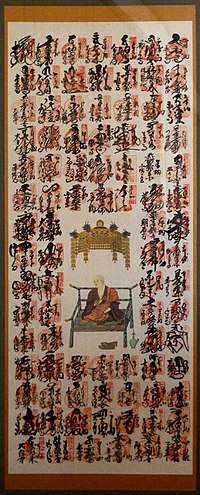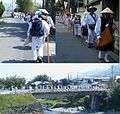Shuin
A shuin (朱印) is a seal stamp given to worshippers and visitors to Shinto shrines and Buddhist temples in Japan. The seal stamps are often collected in books called shuinchō (朱印帳) that are sold at shrines and temples.[1]

The stamps are different from commemorative stamps in that they are made by people who work at the temples: Buddhist monks, or Shinto kannushi. To create the shuin, the writer presses down one or more large stamps, and then uses black ink to write, in his distinctive calligraphy, the name of the temple, the day of the visit, and other messages on and around the stamped portions.
There are various theories about the origin of shuin, though the strongest is that it was a receipt for a dedicated copied sutra. There are still temples where one cannot receive a shuin without having donated a sutra or money, but the majority of the temples will now accept a small amount of money for a shuin. It usually costs 300 yen,[2] though there are some places that charge up to 1000 yen.[3] At Itsukushima Shrine, there is a sign that asks people to dedicate their feelings.
Special shuinchō (and occasionally hanging scrolls) are available for people who do pilgrimages such as the Kansai Kannon Pilgrimage and the Shikoku Pilgrimage. People who do the Shikoku pilgrimage can also get shuin on the white robes they sometimes wear.
A number of Jōdo Shinshū temples do not offer shuin.[4]
Gallery
 shuinchō (朱印帳)
shuinchō (朱印帳) kasane-in (重ね印)
kasane-in (重ね印) byakue (白衣)
byakue (白衣) miei (御影)
miei (御影) sange (散華)
sange (散華) mangan (満願の証)
mangan (満願の証) A shuin from Dairen-ji (大蓮寺)
A shuin from Dairen-ji (大蓮寺) pilgrimage
pilgrimage
References
- 開運ご利益東京・下町散歩: スカイツリー周辺・下町・江戶パワースポット. 2011. ISBN 4056064512.
- 全国「一の宮」徹底ガイド. 2007. ISBN 4569669301.
- "専用色紙に朱印もらおう 津で「七福神めぐり」". Chunichi. Archived from the original on 21 February 2013. Retrieved 24 December 2012.
- "朱印をしない理由". Retrieved 24 December 2012.